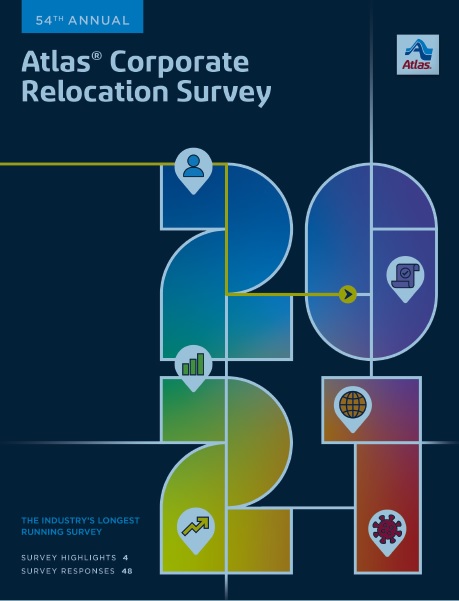On 25th May, Atlas® Van Lines, Inc., published its 54th annual Corporate Relocation Survey, looking at the pandemic’s impact on the world of relocation and workforce mobility. The study also includes comprehensive relocation policy data from industry professionals operating in North American companies and managing employee relocations as part of their job function.
For the analysis, participating firms are categorized by size:
• Small: Fewer than 500 salaried employees (32%)
• Mid-size: 500-4,999 salaried employees (35%)
• Large: 5,000+ salaried employees (34%)
2020 was a challenging year for the relocation industry, with one in three firms indicating relocation volumes decreased overall. This year, 420 decision-makers completed an online questionnaire between January 14 and March 1. 60% work in relocation/mobility service departments, 20% in manufacturing/processing and 9% do financial work. Among firms relocating employees internationally, nearly 40% saw decreases in international volumes last year.
While almost half of the respondents saw budgets increase in 2020, this was necessary as companies responded to the additional challenges of the COVID-19 pandemic. Roughly two in three companies say the pandemic was the most significant external factor that impacted relocations last year.
Even with the challenges of 2020, the outlook for 2021 is optimistic, with approximately half of the firms expecting increases in both overall and international relocation volumes and relocation budgets. Below are additional trends and findings identified in this year’s Corporate Relocation Survey.
COVID-19 Impact
Due to COVID-19, companies relocated employees at much lower rates for work assignments in the U.S. and abroad. It is clear COVID-19 was a deciding factor in moving patterns in 2020, having a unique impact on moving trends. Key findings from surveyed firms surrounding COVID-19 include:
• Nine out of 10 made changes to relocation policy/programs due to COVID-19 last year and anticipate making additional changes in 2021.
• Health concerns/illness/COVID-19 pandemic was the top reason cited by employees declining relocations in 2020, both overall and internationally.
• More than half say COVID-19 increased the complexity of relocation administration and made relocating employees more difficult in 2020.
• Nine out of 10 say they asked relocation providers to perform additional services to meet employee needs due to COVID-19.
Employee Accommodations
Employee accommodations have been popular among firms in the recent past, but with COVID-19 disrupting the typical work-life balance, accommodations surrounding childcare, partner/spouse, caretaker, and more became essential. Firms assisted employees in the following ways in 2020:
• 78% offered childcare assistance for relocating employees while 72% provided accommodations for elder care—both increasing again over last year’s largest percentage measured for these accommodations.
• Offering additional incentives or non-standard exceptions to encourage relocation acceptance increased for a third straight year.
• Companies offered more spouse/partner employment assistance both overall and internationally.
• Alternative assignment use reached the highest level historically, with accommodating employee needs the top reason for use.
The Future of Work
While the world pressed pause in 2020, companies juggled safety needs and the economic pressures of the pandemic to keep business going, even if the physical movement of talent slowed markedly. Looking ahead, companies indicate a readiness to be flexible but persistent in keeping their employees connected and working together. Creative arrangements and timetables for relocation continue, but the view for 2021 is a working world ready to get moving. Firms indicated the following about the future of work:
• 95% of companies surveyed believe at least some portion of their workforce will be remote, either full-time or partially.
• Companies predict around one-third of their workforce will be fully remote, and more than one-fourth will be hybrid workers.
• Nine out of 10 firms have constraints in place for employees working remotely.
• Almost half of small firms expect their workforce to return to office/on-site location entirely; larger firms only expect one out of three employees to return fully.
• Nearly half (42%) plan to require COVID-19 vaccination before employees return to office/location-based work.
The complete survey is available to download here.

